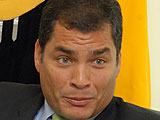Ecuador Blacklisted for Money Laundering
By Eliot Brockner for ISN
Ecuadorian authorities continue to shift their strategy in light of a report released by the International Assessment and Strategy Center (ISAC) about the state's lax efforts at controlling money-laundering activity.
Partly as a result of the report, the Financial Action Task Force (FATF) on 18 February classified Ecuador (along with Iran, North Korea, Ethiopia, Angola, Turkmenistan, and Sao Tome and Principe) as a haven for laundering money and financing terrorism. Initial indignation, wounded national pride and outright rejection of the findings soon yielded to external pagereports of attemptscall_made to overturn the FATF's classification.
Most recently however, it appears that Ecuador is attempting to get off the list as quickly as possible by addressing some of the FATF's concerns, such as criminalizing money laundering and improving procedures for freezing and seizing illegal assets.
One such measure is an increase in integration amongst district attorneys working on money laundering. Twelve district attorneys from Ecuador's Financial Intelligence Unit (UIF), a part of the National Anti-Laundering Council dedicated to detecting money laundering cases in Ecuador, will start looking at money laundering, human trafficking and drug trafficking as interconnected events rather than isolated incidents in hopes of being able to more quickly identify and act upon illegal activity.
In addition to procedural change, the government pledges to battle corruption from within and train people dedicated to combating anti-laundering activity. On 5 March, former UIF director Victor Hugo Briones resigned for failing to report in December 2009 about progress in anti-laundering activity. On 30-31 March, judges, attorneys, police and other public figures received training on recognizing and combating money laundering at the US Embassy.
The frequent changes in strategy and attempts at structural reform of the banking sector highlight the importance the Ecuadorian government lends to getting off the blacklist. As long as Ecuador remains on the blacklist, it remains vulnerable to downgraded credit ratings and skepticism from international creditors. This may lead to a halt of lines of credit from international sources, a much-needed source of income Ecuador can use in public security investment to battle rising levels of delinquency and street crime.
Additionally, the longer Ecuador remains blacklisted, the longer the country's financial sector, including Ecuador's Central Bank and the roughly 25 major private banks that have operations in Ecuador, will remain attractive to proceeds from drug trafficking and other illicit activities.
Some security experts partially attribute the growing presence of international drug trafficking organizations (DTOs) to increasing levels of violence and insecurity in many Central American countries, such as Panama and Honduras. As is the case in both of these countries, Mexican and Colombian DTOs operate in Ecuador, leaving the country at risk for collateral violence associated with the drug trade.
Furthermore, control of cash, DTOs' Achilles' heel, is just as important as the product itself. Attempts to choke the flow of cash, the lifeblood of the drug trade, could also lead to repercussions.
Procedural reform and training courses may not be enough. Ecuador's dollarized economy facilitates laundering money from Ecuadorian banks to dollar-denominated international accounts. Additionally, dirty money that enters the country can more easily enter the local economy without attracting as much suspicion. Removal from the blacklist is merely the first step toward a long battle against narco-activity.

